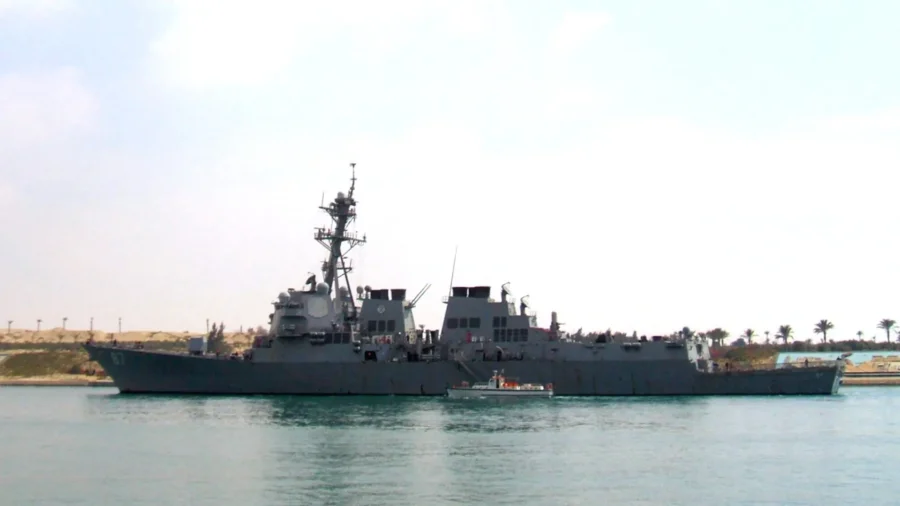The U.S. military now assesses that one or more missiles that were launched from Yemen and traveled in the same general direction as a U.S. warship in the neighboring Gulf of Aden on Monday morning were not targeting the U.S. Navy vessel.
The U.S. Central Command (CENTCOM), the command in charge of U.S. military operations in the Middle East, initially reported a pair of ballistic missiles launched from an area of Yemen controlled by Houthi rebel forces, and that the missiles landed approximately 10 nautical miles (about 11.5 miles) from the Arleigh-Burke class guided-missile destroyer USS Mason at around 1:40 a.m. local time on Monday.
The initial CENTCOM press statement noted these missile launches took place shortly after the USS Mason responded to a distress call from a merchant ship, M/V Central Park, late on Sunday evening and that the U.S. warship’s crew had detained five armed individuals who had boarded the merchant ship.
At a Monday afternoon press briefing, Pentagon Press Secretary Brig. Gen. Pat Ryder shared a preliminary assessment that the individuals who had attacked the M/V Central Park were Somali pirates. He further assessed that the suspected pirates were “not Houthi” and indicated no clear connection between their attempt to seize the M/V Central Park and the ballistic missile launches from Yemen approximately an hour and 40 minutes later.
During his Monday remarks, Brig. Gen. Ryder said it wasn’t clear what the ballistic missiles were targeting. At a Tuesday afternoon press briefing, the Pentagon spokesman delivered a new update, ruling out the possibility that the missiles were meant to strike the U.S. warship or the merchant vessel.
“As it pertains to the incident with the missiles right now, our current analysis is that we know that there was at least one missile fired. We’re continuing to look into that, whether it was one or two, but we know that there was at least one missile,” Brig. Gen. Ryder announced. “And we also, at this point, assess that the vessels the Mason and the Central Park, were not the intended targets. That said, I can’t speak for what the intended target was and would have to refer you to the Houthis.”
Houthi Connection to Missile Launches Unclear
In his initial press statements on Monday, Brig. Gen. Ryder suggested uncertainty as to who exactly launched the ballistic missiles, stating the U.S. military could not be certain “how many other folks have missiles in that region there.”
The Houthis, also known as Ansar Allah, are a Zaydi Shiite movement that has intermittently fought with Yemen’s internationally recognized government since 2004. Their conflict expanded after the Houthis forcefully took over the Yemeni capital of Sanaa in September 2014, bringing on an ongoing civil war that has seen Saudi Arabia and other Gulf states intervene on behalf of the Yemeni government. The United States has supported the Saudi-led coalition throughout the conflict, and the U.S. State Department assesses that Iran is supporting the Houthi side in the conflict.
The Hamas attacks on Israel on Oct. 7, and the subsequent Israeli military response against Gaza served as a flash point for recent Houthi attacks. Leaders within the rebel Yemeni movement have openly claimed responsibility for launching several missile and drone attacks targeting Israeli ports in recent weeks, seizing a cargo ship last week, and shooting down a U.S. military MQ-9 Reaper drone on Nov. 8. On the other hand, Houthi officials, official websites, and affiliated media outlets have made no direct claim of responsibility for ballistic missile launches over the Gulf of Aden on Monday.
During his Tuesday remarks, Brig. Gen. Ryder said the Houthis “have a long history of fomenting instability in the region.” He said U.S. forces operating in the Gulf of Aden and the neighboring Red Sea will continue “working with the international community to ensure regional security and stability whether that’s transiting the international waterways, or working with our partners to provide air defense.”
The Biden administration is currently considering redesignating the Houthis as a foreign terrorist organization. Then-President Donald Trump previously labeled the Yemeni group as a terrorist organization in his final days in office, but President Joe Biden reversed that policy just weeks after assuming office.
Brig. Gen. Ryder referred questions about terrorist designations for the Houthi movement to the U.S. State Department.

